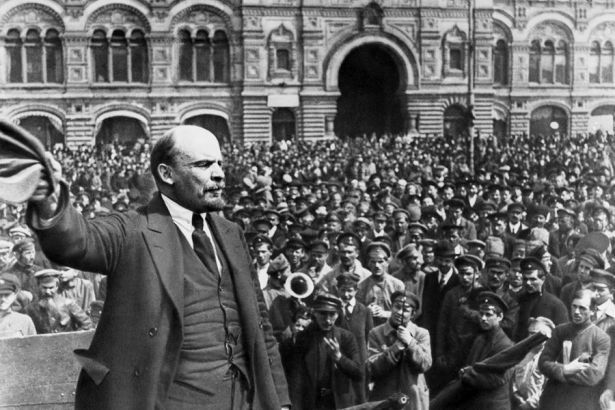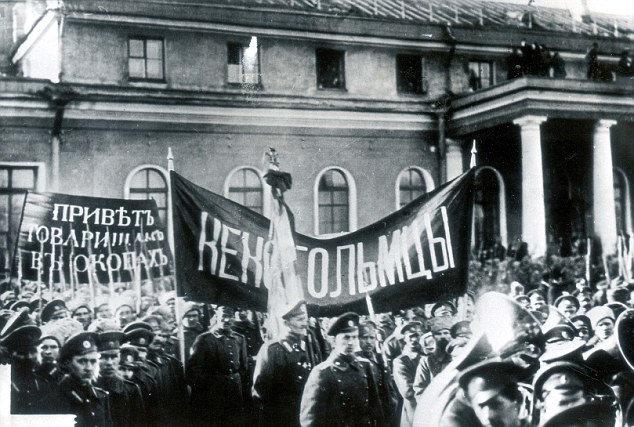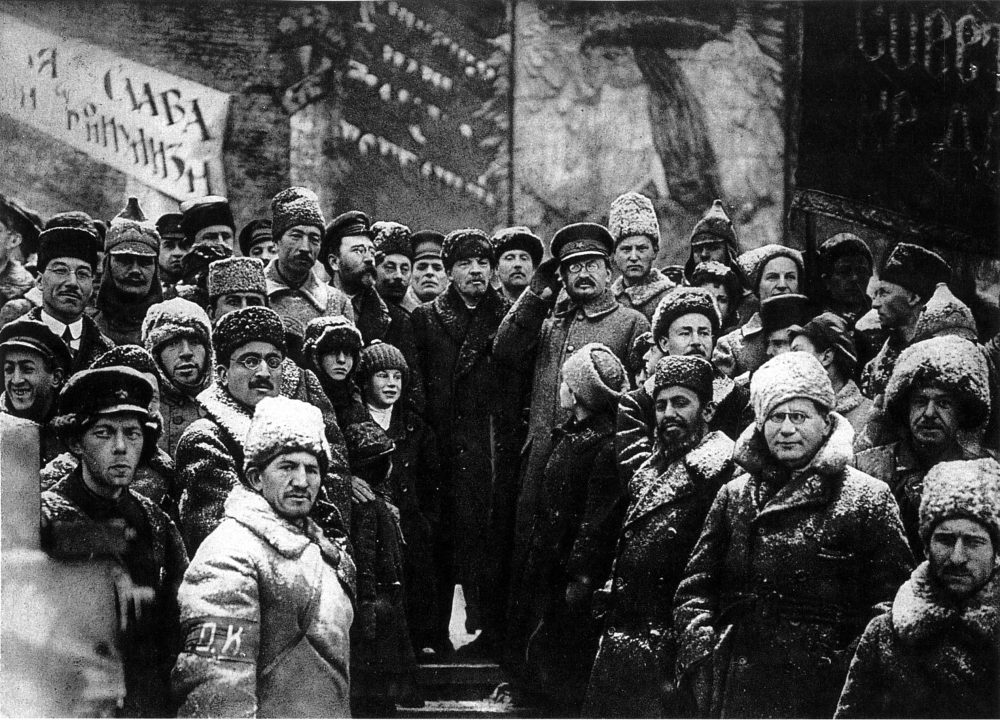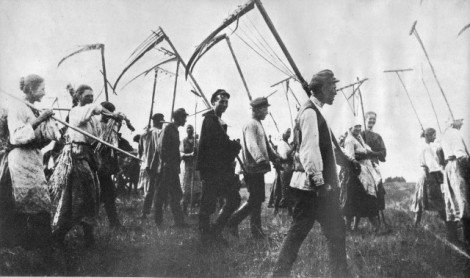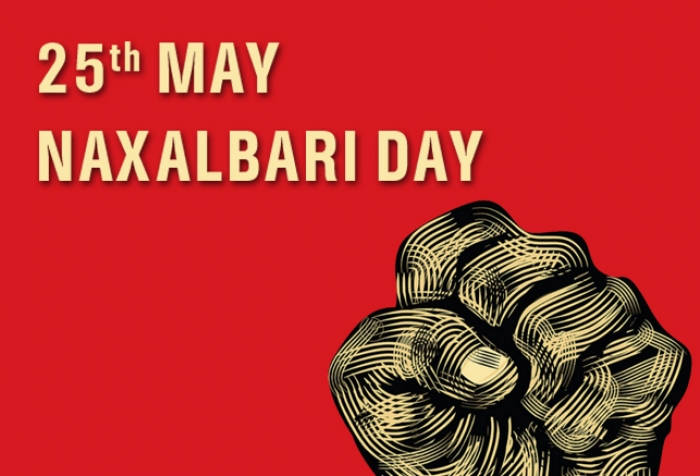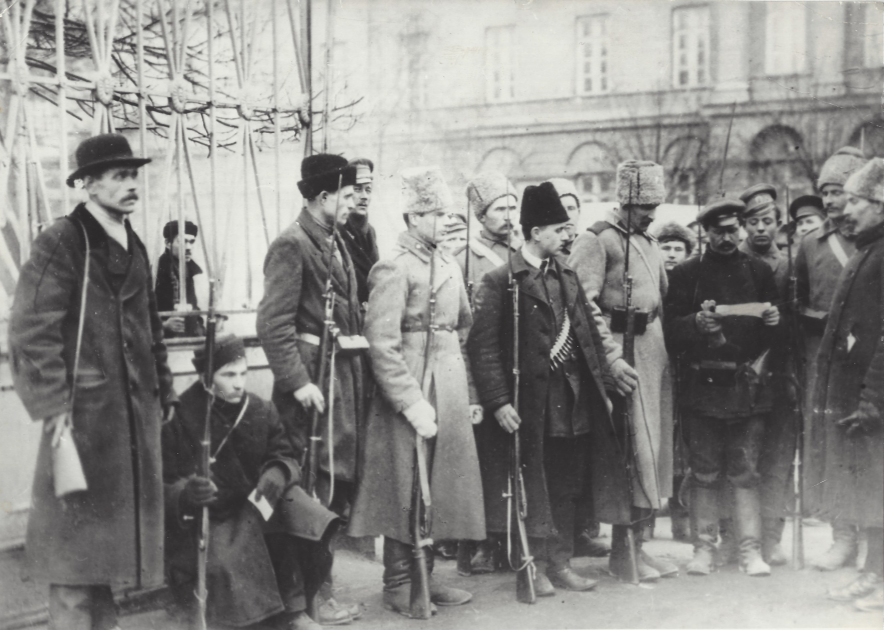
The antiquated and autocratic tsarist political system was more than enough to provide rationale for the Great October Revolution, which has been dealt widely by many political scientists and politicians. Condition of the proletariat in the country the Revolution was organized – Russia – bolstered the rationale. Political developments in the country and political fight the proletariat was waging widened the Revolution’s span. Imperialist World War I made forceful developments, which was like opening a floodgate in politicalscape of the country.
“As Russia faced the possibility of war with Germany in 1914, conservatives warned of the anarchy that might then ensue. In February, former interior minister Pëtr Durnovo famously warned Nicholas II that war with Germany would create ‘exceptionally favorable conditions’ for revolutionary agitation. (Peter Gatrell, Russia’s First World War: An Economic and Social History, Pearson Longman, Harlow 2005, cited in Mark Harrison & Andrei Markevich, “Russia’s Home Front, 1914-1922: The Economy”, Centre for Competitive Advantage in the Global Economy, University of Warwick. CAGE Online Working Paper Series, vol. 2012, no. 74, unpublished, December 20, 2012; Durnovo’s warning was published in Krasnaya nov’, no. 6, 1922)
“The impact of the war on the Russian economy can be easily understood as the net effects of a battery of nearly simultaneous shocks. The first shock was the military mobilization, which drafted fifteen million men into the army, mainly from the countryside, and with them millions of horses. These were a loss to the supply side of agriculture.” (Mark Harrison and Andrei Markevich, ibid.)
“When war broke out in 1914, government officials [of the Russian Empire] mobilized just [fewer than] four million men, composed of the peacetime standing army and reserves plus the first wave of conscripts. Every few months, the government mobilized more classes, effectively lowering the draft age in 1915 to nineteen, eliminating exemptions for certain family situations/occupations, and eventually, in 1916, drafting ‘exempted’ ethnic minorities into the army as laborers. Troubles accompanied every stage of the process, with mobilization riots in many areas in July and August in 1914; with an estimated five hundred thousand desertions in the first year of the war alone; riots and strikes after the government announced the 1915 lowering of the draft age; and the outbreak of major civil disturbances in Central Asia with the labor drafts of 1916. Mayhem accompanied some of these changes. [….] Eventually the Russian government had to divert a special force to the steppe to deal with the uprising caused by attempted mobilization. The Russian experience of mobilization led to millions of men joining the army for war service, but it also led to significant resistance, desertion, and, over time, dissatisfaction.” (Tammy M Proctor, Civilians in a World at War, 1914-1918, New York University Press, New York & London, 2010)
“In rural Russia, […] [some reservists] resisted in 1914. [I]n the Tomsk province […], mobs rioted to protest requisitioning of horses, closing of liquor stores, and lack of provisions for those called up for service. In […] Birsk [city], officials had to deal with a group of conscripts destroying their induction center.” (ibid.)
Problems multiplied as the war continued, and defeats began to visit the Empire.
“[The] territory [lost to Germany and Austria-Hungary] was […] home to 11.7 million people, of whom two to three million sought refuge in Russia. A still larger number fled the regions that, although not occupied, were too close to the front for safety, making a total figure of 9.7 million up to 1917. The territory lost was chiefly farmland, so on the supply side Russian’s agricultural production was directly reduced by about 6 percent. On the demand side, the refugees swelled the population under control of the Imperial government and so the demand for food. (Peter Gatrell, A Whole Empire Walking: Refugees in Russia During the First World War, Indiana University Press, Bloomington, 1999 in Andrei Markevich & Mark Harrison, “Great War, Civil War, and Recovery: Russia’s National Income, 1913 to 1928,” Journal of Economic History, 71, 3, 2011)
The Bolsheviks under the leadership of Lenin opposed the fratricidal imperialist war while the bourgeoisie that occupied power was bent on continuing the bloodbath, a war that was taking heavy toll from an already ruined people. Lenin sounds cautionary signal: “Catastrophe will not wait. It is advancing with terrific speed. [….] Just think what a madhouse this is: the country is on the rocks, the people are on the verge of famine and disaster, there is a shortage of coal and iron although they can be mined [….] Meanwhile the crisis is mounting and catastrophe is drawing even nearer. [….] [T]he […] capitalists […] are ‘deliberately’ (this word was used by the Economic Department) trying to bring production to a standstill. The government is on their side.” (“Crisis is approaching, dislocation is increasing”, Collected Works, vol. 25, Progress Publishers, Moscow, erstwhile USSR, 1977, emphasis in the original)
On July 18 (5), 1917 Lenin declared:
“Democracy is the rule of the majority. [….] During the several months that have passed since February 27 the will of the majority of the workers and peasants, of the overwhelming majority of the country’s population, has become clear in more than a general sense. Their will has found expression in mass organizations – the Soviets of Workers’, Soldiers’ and Peasants’ Deputies.
“How, then, can anyone oppose the transfer of all power in the state to the Soviets? Such opposition means nothing but renouncing democracy! It means no more no less than imposing on the people a government which admittedly can neither come into being nor hold its ground democratically, i. e., as a result of truly free, truly popular election. [….]
“[T]he government’s policies in particular, are all departures from revolutionary principles, and breaches of democracy. [….]
“Things are moving by fits and starts towards a point where power will be transferred to the Soviets, which is what our party called for long ago.” (“All power to the Soviets”, ibid.)
On July 7 (20), the provisional government orders Lenin’s arrest. Lenin, on October 1-2 (14-15), writes his message: “To Workers, Peasants, and Soldiers”.
In the message, he calls on them to overthrow the Kerensky government, and hand power to the Soviets of Workers’, Soldiers’ and Peasants’ Deputies. “Not for a single day longer can we suffer the peasants to be suppressed by armed forces, thousands upon thousands to perish in the war, when a just peace can and must be offered at once. [….] All power to the Soviets of Workers’ and Soldiers’ Deputies!” (CW, vol. 26, 1972, emphasis in the original)
Stalin echoed the same:
“Developments in home and foreign affairs, the protracted war and the longing for peace, the defeats at the front and the need to defend the capital, the rottenness of the Provisional Government and its projected ‘removal’ to Moscow, economic disruption and starvation, unemployment and exhaustion – all this is irresistibly impelling the revolutionary classes of Russia to power. [….] The time has at last come for the revolutionary slogan “All power to the Soviets!” to be put into effect.” (“Soviet power”, J V Works, vol. 3, Foreign Languages Publishing House, Moscow, USSR, 1953)
Clearly visible were the bourgeois government’s incapacity and inaction, and the deepening crisis in all areas of life.
On August 19, 2017, Stalin, in an article in Proletary, identified the political array: “An ‘honest coalition’ of Kerensky, Milyukov and Tsereteli, financed by the American capitatists, against the revolutionary workers of Russia”. In a sarcastic tone he concluded the article: “Very good, we make note of it.” (“American billions”, ibid.)
Dan, a prominent leader of the Menshevik Party, a diehard opponent of the Bolshevik Party, described the revolutionary situation and élan in the months preceding October 1917:
The masses “began more and more frequently to express their discontent and their impatience with impetuous movements, and ended […] by turning to communism [….] Strikes followed one after the other. The workers sought to answer the rapid rise in the cost of living with wage rises. But all their efforts failed with the continuous drop in value of paper money. The Communists launched in their own ranks the slogan of ‘workers’ control’ and advised them to take the running of the factories into their own hands, in order to stop the ‘sabotage’ of the capitalists. At the same time, the peasants started to take over the big properties, to chase out the land owners and to set fire to their manor houses.” (Martov-Dan, Geschichte der russischen Sozialdemokratie, Berlin, 1926, cited in Ernest Mandel, October 1917: Coup d’état or social revolution?, Notebooks for study and research no.17/18, IIRE, Amsterdam, 1992)
Lenin, on October 25 (November 7), in an appeal from Smolny, the building that once housed an educational institute, on behalf of the Revolutionary Military Committee, announced the overthrow of the Provisional Government, and the transfer of power:
“The Provisional Government has been deposed. State power has passed into the hands of the organ of the Petrograd Soviet of Workers’ and Soldiers’ Deputies – the Revolutionary Military Committee […]
“The cause for which the people have fought, namely, the immediate offer of a democratic peace, the abolition of landed proprietorship, workers’ control over production, and the establishment of Soviet power – this cause has been secured.
“Long live the revolution of workers’ soldiers’ and peasants!” (“To the citizens of Russia”, CW, vol. 26)
Anatoly Lunacharsky describes Smolny in those epoch-making moments in his “Smolny on the Night of the Storm”:
“Smolny was brightly lit from top to bottom. Crowds of excited people were hurrying back and forth along its many corridors. There was great animation everywhere, but the most impetuous human stream, a real flood of impassioned people, was the one that made its way towards the end of the corridor on the top floor, where, in the most remote back room of all, the Military Revolutionary Committee was in session. [.…]
“Instructions were given and appointments made there on the spot, […] they were rapidly dictated to typists whose machines never ceased their clatter, were signed in pencil on an official’s knee, and in a few minutes some young comrade, happy to have been entrusted with a task, would be racing through the night in a car driven at breakneck speed. In the room […], several comrades sat at a table constantly telegraphing in all directions, flashing orders like electric currents to the insurgent towns of Russia.
“I still recall in wonder the amazing amount of work done there and consider the activities of the Military Revolutionary Committee at the time of the October Revolution to be one of those manifestations of human energy that demonstrate the inexhaustible reserves stored up in the heart of a revolutionary, and what that heart is capable of when aroused by the thunderous voice of the Revolution.
“The Second Congress of Soviets opened in the White Hall of the Smolny Institute that evening.
“The deputies were in a triumphant, festive mood. There was tremendous excitement, but not the slightest sign of panic although fighting was going on round the Winter Palace and at times news of a most alarming nature was brought in.
“When I say there was no panic I am referring to the Bolsheviks and the overwhelming majority of the Congress that was on their side. [.…]
“When the session at last began, the mood of the Congress became quite clear. The speeches of the Bolsheviks were received with tremendous enthusiasm. [.…]
“What a never-ending storm of applause greeted the long-awaited news that the Soviets had, at last, captured the Winter Palace, and that the capitalist Ministers had been arrested! [.…]
“Lenin was in his element; he was happy, he worked without let-up, and in some far comer he wrote those decrees of the new government that were, as we know now, to become the most famous pages in the history of our age.
“[….] With amazing mental composure Lenin studied the way tasks had to be done and took them in hand in the same way as an experienced pilot takes over the wheel of a giant ocean liner.”
John Reed in Ten Days that Shook the World describes the fall of the Provisional Government:
“WEDNESDAY, November 7th […] It was a raw, chill day. [….] I ran into Captain Gomberg, Menshevik oboronetz, secretary of the Military Section of his party. When I asked him if the insurrection had really happened he shrugged his shoulders in a tired manner and replied, “Tchort znayet! The devil knows! Well, perhaps the Bolsheviki can seize the power, but they won’t be able to hold it more than three days. They haven’t the men to run a government. Perhaps it’s a good thing to let them try — that will furnish them& [….] At the Mikhailovsky a man appeared with an armful of newspapers, and was immediately stormed by frantic people, offering a rouble, five roubles, ten roubles, tearing at each other like animals. It was Rabotchi i Soldat, announcing the victory of the Proletarian Revolution, the liberation of the Bolsheviki still in prison, calling upon the Army front and rear for support [….] The massive façade of Smolny blazed with lights as we drove up, and from every street converged upon it streams of hurrying shapes dim in the gloom. Automobiles and motorcycles came and went; an enormous elephant-colored armored automobile, with two red flags flying from the turret, lumbered out with screaming siren. It was cold, and at the outer gate the Red Guards had built themselves a bon-fire. At the inner gate, too, there was a blaze, by the light of which the sentries slowly spelled out our passes and looked us up and down. [….] A crowd came pouring down the staircase, workers in black blouses and round black fur hats, many of them with guns slung over their shoulders, soldiers in rough dirt-colored coats and grey fur shapki pinched flat [….] The extraordinary meeting of the Petrograd Soviet was over. I stopped Kameniev — a quick moving little man, with a wide, vivacious face set close to his shoulders. Without preface he read in rapid French a copy of the resolution just passed:
“‘The Petrograd Soviet of Workers’ and Soldiers’ Deputies, saluting the victorious Revolution of the Petrograd proletariat and garrison, particularly emphasises the unity, organisation, discipline, and complete cooperation shown by the masses in this rising; rarely has less blood been spilled, and rarely has an insurrection succeeded so well. [….]
“‘The Petrograd Soviet of Workers’ and Soldiers’ Deputies calls upon the workers and the peasants of Russia to support with all their energy and all their devotion the Proletarian Revolution. The Soviet expresses its conviction that the city workers, allies of the poor peasants, will assure complete revolutionary order, indispensable to the victory of Socialism. The Soviet is convinced that the proletariat of the countries of Western Europe will aid us in conducting the cause of Socialism to a real and lasting victory. [….]’
“It was 10.40 P. M. [….]
“So, with the crash of artillery, in the dark, with hatred, and fear, and reckless daring, new Russia was being born. [….]
“I picked up a copy of the paper, and under a fleeting street-light read:
“‘TO THE CITIZENS OF RUSSIA!
“‘The Provisional Government is deposed. [….]’
“‘The Second All-Russian Congress of Soviets of Workers’ and Soldiers’ Deputies representing the great majority of the Soviets, and a number of Peasant deputies, based upon the will of the great majority of the workers’, soldiers and peasants, based upon the triumphant uprising of the Petrograd workmen and soldiers, the Congress assumed power.
“‘The Soviet authority ensured convocation of the Constituent Assembly.
“‘The Congress resolved that all local power shall be transferred to the Soviets of Workers,’ Soldiers’ and Peasants’ Deputies.
“‘The new government began taking a determined policy of requisition and taxation of the propertied classes.’”
Began a new dawn, the world never ever has experienced, with a solemn proclamation:
Unite and struggle for a world, where people are not chained, cheated, deceived, exploited, muzzled, segregated and trampled, where people unite in fraternity, where lie does not rein life.
The article is the 6th part, in abridged form, of a series composed on the occasion of the Great October Revolution Centenary. The 1st, 2nd, 3rd and 4th parts of the series were carried by Countercurrents.org.
Farooque Chowdhury, a Dhaka-based freelancer, has not authored/edited any book in English other than Micro Credit, Myth Manufactured (ed.), The Age of Crisis and What Next, The Great Financial Crisis (ed.), and he doesn’t operate any blog/web site.

